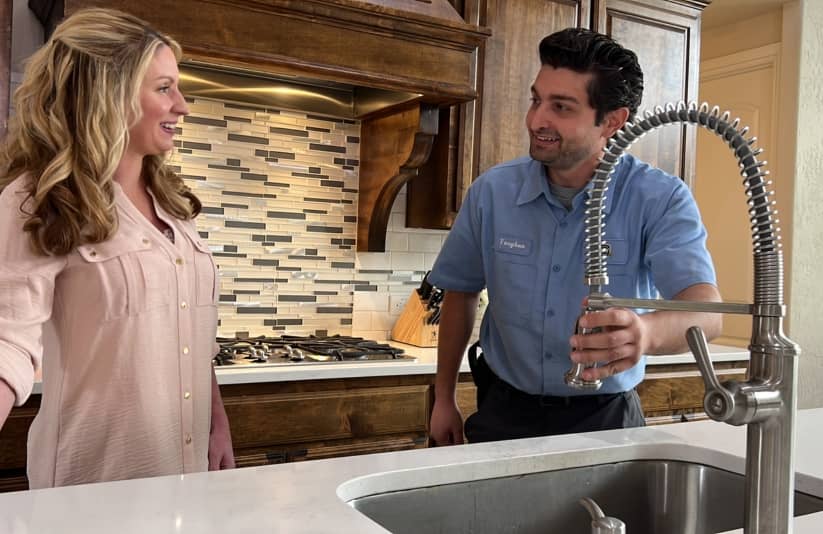Leak Detection & Repair
Leak Detection and Repair by CW Service Pros
If your home has a leak in a water pipe, drain, or main line, it's important to call a professional plumber experienced in leak detection and repair right away. Water leaks can cause serious damage to your home and furnishings, and some can even cause health hazards.  It's not always easy to see where a leak is coming from. If there's a leak in your house and you can't find the source, calling a licensed plumber is the best thing to do.
It's not always easy to see where a leak is coming from. If there's a leak in your house and you can't find the source, calling a licensed plumber is the best thing to do.
Why Use CW Service Pros for Leak Detection and Repair?
CW Service Pros uses the latest technology to detect and repair leaks with minimal destruction to your home. With CW Service Pros, you’ll receive stellar customer service, including:
- Same day appointments– We offer same day appointments in many cases and take special care to leave our work site clean and presentable!
- Courteous Plumbers – Every technician is background checked, drug tested, and performs continuous training in plumbing and customer care. Our plumbers care about you!
- Simple, upfront pricing –We will review your situation, and provide a written estimate before any work starts.
- Satisfaction guaranteed –If you’re not happy with our work for any reason, we will continue working until we exceed your expectations!
- 24/7 emergency service – Got an issue that just can’t wait? Call us any time, any day. We’re here to help!
- Our customers love us!We are continuously recognized by sites such as Angie’s List, HomeAdvisor, Thumbtack, Expertise.com, and more! We’re also A+ rated with the Better Business Bureau!
How does CW Service Pros Detect Leaks?
Our plumbers use several different methods to find leaks around your home and yard. In most cases it takes 30 to 90 minutes to find the source of a leak.
- Visual inspection— This is what we start with to see if there are any signs that point to the location of the leak.
- Sewer camera inspection— A small camera on the end of a device like a plumber's snake is pushed through the pipes to find out where the leaks are.
- Electronic leak location — A low-voltage device picks up and amplifies the sounds that leaks make. We can use electronic detection to find even small pinhole leaks in pipes and lines.
- Pressure test — This can be done on the whole water system and can also be used for detecting leaks in sewer lines and gas lines.
How does CW Service Pros Repair Leaks?
The leak repair methods we use depend on where the leak is, how many leaks there are, and the condition of the leaking pipe or line. If the pipe is in good condition and there are only one or two small leaks, they can be patched. If the pipe is in bad condition, it might be better to reroute the line or replace it altogether.
- Spot repair — The site of the leak is exposed for spot repairs. This could be done by opening up the foundation slab, accessing the pipe through a wall, or digging up a spot in the yard.
- Re-piping — If a whole pipe or line is in bad condition, it can be replaced entirely.
- Epoxy pipe coating — We only recommend pipe coating in unique situations, like patching small leaks in yards where plumbing runs under retaining walls. This method involves using an epoxy resin to coat the inside of an existing pipe to patch it. If the pipes are not in perfect alignment or if there is a low spot in the line, epoxy pipe coating usually isn't a good choice.
- Pipe Bursting — Pipe bursting is a method of repair where a pipe sleeve is placed in the pipe then pressed against the walls of the existing pipe by a balloon. Pipe bursting is only used in select instances. Improper sloping of a pipe and pipes that are not in alignment cannot be repaired using this technique.
For slab leaks, we can do spot repairs through the slab, we can tunnel from outside the home, or we can reroute the line entirely to access a damaged pipe and try to prevent further damage to the floors inside the home. The most effective repair method for yard leaks is to dig down to the pipe to replace the bad section. If a leak is repaired by a skilled plumber who uses quality materials, you’re unlikely to have a problem again. No matter where the leak is, our policy is to use the best method of repair to fix the problem for the long-term, while keeping disruption of your life to a minimum.
Financing Options with CW Service Pros
We offer financing with Synchrony for leak detection and repairs. If your credit is approved, you can qualify for up to 18 months at no interest, or a longer term with interest. Click here for more information.
Will Insurance Cover your Leak Detection and Repair?
Insurance considerations are another reason to perform leak detection and get problems fixed quickly. This is because your insurance is more likely to cover the cost if work is done as soon as you know there's a leak. Insurance is unlikely to pay if the leak has been around for months or years because they consider ignoring the issue as negligence and the resulting damage preventable with proper maintenance. If you're claiming a loss on your insurance, CW Service Pros can help make it much easier for you. We work with you and your insurance company and will submit an invoice that clearly details the work we've done.
Call CW Service Pros Today for Leak Detection and Repair
If you have a leak somewhere in your home, or you think you have a leak but can't find it, it's important to get the problem identified and fixed as soon as possible. Call CW Service Pros today 972-395-2597, and one of our licensed, expert plumbers will come to your home and find the source of the leak with our advanced leak detection options. Once the problem is located, we'll talk you through your repair options and work to get the problem taken care of quickly.
Save money and grief
Have More Questions and Leaks?
What Causes Leaks?
Drains and pipes — Drains can leak due to normal wear-and-tear as they age. This is common in the Dallas-Fort Worth area in older houses with cast-iron drains or sewer lines. Other problems, like poor water quality and overusing chemical drain cleaners can cause corrosion too. Pipes can be broken by tree roots growing through pipes or shifting soil.
- Slab leaks — These are leaks that happen underneath your home's concrete slab foundation. Slab leaks often develop because of shifting soil, like when clay soils expand and contract in very hot or cold weather. A poorly laid foundation or areas of rocky soil can also damage your pipes.
- Yard leaks — You might think your yard is safe, but leaks can happen in water or sewer lines. Common causes are poor water quality, poor workmanship, lack of maintenance, or shifting soil.
- Gas leaks — Leaks in gas pipes and lines are usually because of poor workmanship or because the pipes are old and deteriorating. Black gas lines over time with exposure to the elements will corrode and cause small leaks that need repaired.
How do you know if you have a water leak?
Most leaks cause at least one or two warning signs, so look out for:
- An unexplained increase in your water bill
- Warm damp or wet spots on the floor
- Low water pressure in one or more faucets
- The sound of running or trickling water in an unusual place
- Development of mildew or mold
- Blistering paint or wallpaper
- Stains or moist, spongy areas on the floor, walls, or ceiling
- A musty smell
- Cracks in the home's foundation or shifting of the ground for no apparent reason
- Smell of rotten eggs or ammonia smell in or around the home
A dripping faucet or showerhead is easy to see, but sometimes the source of a leak is hidden. This means it might exist for months or years without being noticed. If you see any of the above signs, it’s time to call a plumber for leak detection.
What problems can be caused by water leaks?
Small water leaks are easy to overlook, but even if a leak looks small, it might be causing damage somewhere you can't see. What do you risk by letting a water leak go?
- Higher water bills and thousands of gallons of water wasted — A single leaking faucet can waste up to 3,000 gallons a year.
- Damaged drywall, plaster, paint, and wallpaper — Even a small amount of water can do this. A water leak in an upstairs room can potentially lead to a ceiling collapse.
- Mold, mildew, and rot — These can reduce the structural integrity of your home and potentially be health hazards.
- Higher humidity — This can damage furnishings and electrical equipment.
- A damaged foundation — This is typically caused by a slab leak and could lead to subsidence and requiring expensive foundation repairs.
When you notice a leak in your home, it's vital to get it fixed ASAP, even if it's only a small one. The first step is leak detection.
What are the signs of a gas leak?
If there's a gas leak in or around your home, you might notice one or more of these signs:
- The smell of rotten eggs
- A whistling or hissing sound near a gas pipeline or gas appliance
- Discolored or dead plants near a gas pipeline
- Debris near a gas pipeline being blown into the air
- Higher than normal gas bill
What should you do if you have a gas leak?
If you suspect a gas leak, the most important thing to do is evacuate your home right away. Make sure that all family members and pets are outside. Don't stop to turn off the gas or open windows, but do leave the door open as you go. Once everyone is safely outside, call CW Service Pros to repair the issue and the utility company to turn off the gas to your home. Most utility companies help to detect the source of the leak, but they won’t repair it. Repairing a gas leak requires a high level of skill and experience, so homeowners shouldn't attempt these repairs. Instead, call a licensed plumber to get the job done safely.
How can leaks be prevented?
Preventing leak damage is mostly about knowing what the signs of a leak are and getting leaks fixed when they appear. There are also some things you can do to reduce the risk that you’ll have a leak in the first place! Water leaks may be prevented by:
- Testing your home’s water pressure — If it's too high, a leak is more likely to develop, especially if your pipes are old. An ideal water pressure is between 55 and 75 psi. Anything over 80psi is extremely high and can lead to leaks. Installing a water pressure regulator will lower the pressure on the water system and extend its life.
- Replace old interior supply lines to faucets, toilets, and appliances with braided steel hoses. Plastic and rubber hoses as well as one piece water shut offs with attached corrugated supply lines are known to cause floods.
Sewer leaks may be prevented by:
- Having a drain camera inspection of the drain line performed periodically
- Having a hydrostatic leak detection test of the system done every few years by your plumber to catch any issues early before damage is done to the interior of the home or foundation.
Gas leaks may be prevented by:
- Inspecting gas appliance connections by spraying connections with soapy water and watching for bubbles. If bubbles are seen then you have a leak and need to call a plumber to fix the problem and verify the system has no other leaks.
















